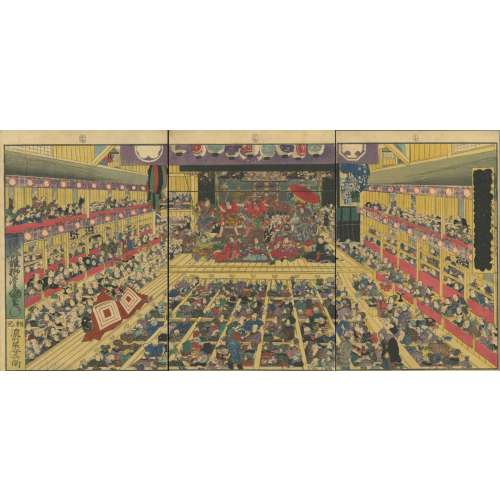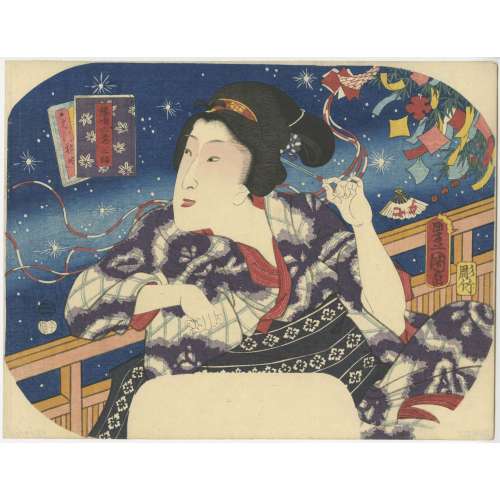-
 Superb Edo pictures illustrating dances (Odori keiyô Edo-e no sakae): Interior of an imaginary theatre with a performance of Shibaraku 「踊形容江戸絵栄」. Artist: Utagawa Kunisada [歌川 国貞] a.k.a. Utagawa Toyokuni III [三代歌川豊国] (Japanese, 1786 – 1865). Publisher: Nōshūya Yasubei (Japanese, fl. c. 1851 – 1870). Year: 1858 (Ansei 5), 7th month. Size: Vertical ôban triptych; 36.9 x 75.7 cm. Signed: 一陽斎雛獅豊国筆(年玉印) – Ichiyôsai Hinashi Toyokuni ga (on the left sheet only). Censor's seal: Horse 7 [午七 彫師]. Subject: Shibaraku. Ref.: MFA impression: 11.44263a-c; Robert Schaap. Kunisada (2016), p. 101 [LIB-1212.2017]. Ref.: [LIB-1197.2016] Arendie and Henk Herwig. Heroes of the Kabuki stage: an introduction to Kabuki with retellings of famous plays, illustrated by woodblock prints. — Amsterdam: Hotei Publishing, 2004; p. 38. [LIB-3316.2024] Chris Uhlenbeck, Jim Dwinger, Josephine Smit. The Riddles of Ukiyo-e: Women and Men in Japanese Prints. — Brussels: Ludion, 2023, p. 218-9, № 107.
Superb Edo pictures illustrating dances (Odori keiyô Edo-e no sakae): Interior of an imaginary theatre with a performance of Shibaraku 「踊形容江戸絵栄」. Artist: Utagawa Kunisada [歌川 国貞] a.k.a. Utagawa Toyokuni III [三代歌川豊国] (Japanese, 1786 – 1865). Publisher: Nōshūya Yasubei (Japanese, fl. c. 1851 – 1870). Year: 1858 (Ansei 5), 7th month. Size: Vertical ôban triptych; 36.9 x 75.7 cm. Signed: 一陽斎雛獅豊国筆(年玉印) – Ichiyôsai Hinashi Toyokuni ga (on the left sheet only). Censor's seal: Horse 7 [午七 彫師]. Subject: Shibaraku. Ref.: MFA impression: 11.44263a-c; Robert Schaap. Kunisada (2016), p. 101 [LIB-1212.2017]. Ref.: [LIB-1197.2016] Arendie and Henk Herwig. Heroes of the Kabuki stage: an introduction to Kabuki with retellings of famous plays, illustrated by woodblock prints. — Amsterdam: Hotei Publishing, 2004; p. 38. [LIB-3316.2024] Chris Uhlenbeck, Jim Dwinger, Josephine Smit. The Riddles of Ukiyo-e: Women and Men in Japanese Prints. — Brussels: Ludion, 2023, p. 218-9, № 107. -
 Artist: Utagawa Kunisada [歌川 国貞], a.k.a. Utagawa Toyokuni III [三代 歌川 豊国] (Japanese, 1786 – 1865). Signed: Toyokuni ga [豊国 画] in a red toshidama cartouche Block carver: Yokokawa Takejirō [横川竹二郎] (Japanese, fl. 1845 – 1863), seal: 彫竹 – Hori Take. Publisher: Ibaya Senzaburō [伊場屋仙三郎] (Japanese, fl. c. 1845 – 1847). Combined date and kiwame seal: Ansei 5 (II-XII/1858). Size: Untrimmed fan print (uchiwa-e), 300 x 232 mm.
Artist: Utagawa Kunisada [歌川 国貞], a.k.a. Utagawa Toyokuni III [三代 歌川 豊国] (Japanese, 1786 – 1865). Signed: Toyokuni ga [豊国 画] in a red toshidama cartouche Block carver: Yokokawa Takejirō [横川竹二郎] (Japanese, fl. 1845 – 1863), seal: 彫竹 – Hori Take. Publisher: Ibaya Senzaburō [伊場屋仙三郎] (Japanese, fl. c. 1845 – 1847). Combined date and kiwame seal: Ansei 5 (II-XII/1858). Size: Untrimmed fan print (uchiwa-e), 300 x 232 mm.A young woman adjusting her hairpin on a balcony during the Tanabata festival, as inscribed on the white folding fan: [七夕] (Tanabata).
Inscription on the blue book (print title): Early autumn [はつ秋や] (hatsu akiya), inscription on the purple book (series title): Short love songs, second volume [端唄の意 二編] (Hauta no kokoro nihen). According to Marks (2010), Hauta no kokoro nihen series of fan prints was published by Ibaya in 1858 (p. 267|P6871).
The series refers to love songs of a certain type popular in late Edo. They were performed with the accompaniment of a shamisen, “Seven herbs of autumn, the song of the insects is not heard; the bodies of lightning bugs are burnt, and the precious writings of love are getting thinner like the song of the insects as I am waiting for you. So, on an early autumn evening, I spot the glitter of a lightning bug that lingered among the autumn grasses, and while listening to the pine cricket, I am singing with my heart troubled by love". [Tokyo National Museum; translation provided by Elena Varshavsky].Tanabata [たなばた] or [七夕] – meaning "Evening of the seventh", also known as the Star Festival [星祭] (Hoshi matsuri) – is a Japanese festival originating from the Chinese Qixi Festival. One popular Tanabata custom is to write one's wishes on a piece of paper and hang that piece of paper on a specially erected bamboo tree, in the hope that the wishes become true.


